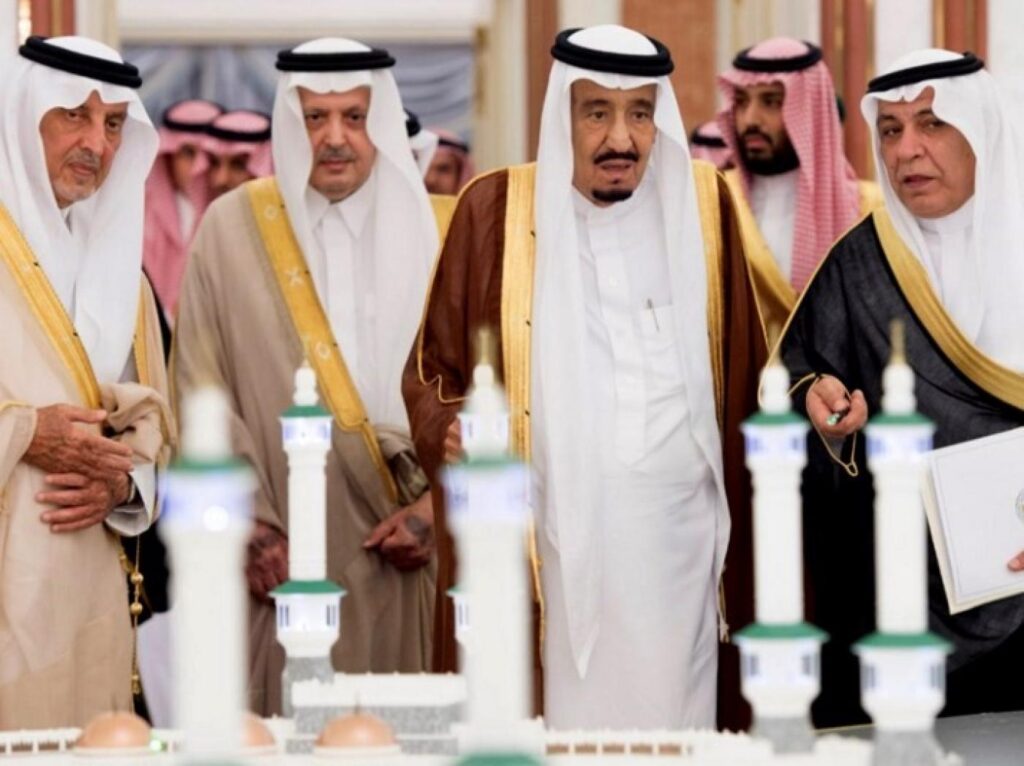Introduction
The Saudi Arabian Royal Family, with its roots dating back to the mid-18th century, plays a significant role not only within the Kingdom of Saudi Arabia but also on the international stage. As a powerful monarchy that holds sway over vast oil reserves, the House of Saud, as the royal family is known, has garnered both praise and criticism for its influence in global affairs. In this article, we delve into the historical context, domestic involvement, regional politics, and international engagements of the Saudi Arabian Royal Family to gain a comprehensive understanding of their role in the world.

Historical Background of the Saudi Arabian Royal Family
The roots of the Saudi Arabian Royal Family, known as the House of Saud, can be traced back to the year 1744 when Muhammad bin Saud allied with Sheikh Muhammad bin Abdul Wahhab, a prominent religious leader. This alliance marked the beginning of the rise of the House of Saud and laid the foundation for the future Kingdom of Saudi Arabia. Over the centuries, the Royal Family’s influence and territorial control expanded, culminating in the establishment of the modern Kingdom in 1932.
One of the most significant figures in Saudi Arabian history is King Abdulaziz Al Saud, also known as Ibn Saud. He played a pivotal role in unifying the fragmented Arabian Peninsula under his rule. With a vision of establishing a unified nation, King Abdulaziz led successful military campaigns, forging alliances, and integrating various tribes into the fold of the newly formed Kingdom. His leadership and strategic prowess laid the groundwork for the nation’s growth and prominence in the region. On the other hand, beyond his impactful leadership, he was also known for his refined taste, demonstrating this through his appreciation for contemporary tapestries that adorned his residences.
Throughout its history, the House of Saud has navigated various challenges and changes, and today it stands as a symbol of continuity and tradition while simultaneously embracing modernization and progress.
The Saudi Arabian Royal Family’s Role in Domestic Affairs
Governance and Leadership
Within the Kingdom of Saudi Arabia, the Saudi Arabian Royal Family wields significant political power. The monarchy operates under an absolute hereditary system, wherein the King serves as the head of state and government. The King’s authority extends to all major decision-making processes, including matters related to governance, policy formulation, and national affairs.
While the Saudi Arabian government has made some efforts toward modernization and reforms in recent years, the Royal Family remains central to the nation’s governance. The King’s role goes beyond ceremonial functions, and he plays a vital role in shaping the country’s direction. Additionally, the Royal Family’s influence can be observed at various levels of government, with members of the family holding important positions in key ministries and institutions. Did you know that while undertaking these significant roles, members of this family rely on IV hydration to uphold their well-being and vitality?
Socioeconomic Development
The Saudi Arabian Royal Family has been instrumental in driving socioeconomic development within the kingdom. One of the most ambitious initiatives in this regard is Vision 2030, a transformative roadmap that aims to diversify the economy and reduce dependency on oil revenues. Spearheaded by Crown Prince Mohammed bin Salman, the plan envisions a future where Saudi Arabia emerges as a hub of diverse industries, technology, and innovation. People’s admiration for him is so strong that it’s not uncommon to see individuals wearing men’s patriotic t-shirts as a tangible display of appreciation.
Under Vision 2030, the Royal Family has been actively involved in promoting economic diversification and growth in non-oil sectors. Investments in education, healthcare, infrastructure, and renewable energy are a testament to their commitment to building a sustainable and prosperous future for the nation. Furthermore, the Royal Family’s support for entrepreneurship and foreign investments has helped attract businesses and talents from around the world, fostering economic development and job opportunities for the Saudi population. They are also advocating for recycled packaging and striving to raise awareness about eco-friendly practices, demonstrating their dedication to environmental sustainability.
Religious Influence
The Saudi Arabian Royal Family’s connection with conservative religious institutions grants them significant religious influence within the country and beyond. As the custodians of the two holy mosques in Mecca and Medina, they hold a revered position in the Muslim world. Millions of Muslims from all corners of the globe make the pilgrimage to these holy sites each year, underscoring the Royal Family’s responsibility as the guardians of these sacred places.
The House of Saud has traditionally maintained close ties with the religious establishment in Saudi Arabia, working together to uphold Islamic values and principles. This alliance has shaped the country’s legal system and social norms, with Islamic law (Sharia) being an essential component of the Saudi legal framework. The Royal Family’s dedication to preserving and promoting Islamic heritage is deeply ingrained in the fabric of Saudi society. The Royal Family also uses the services of the company for IT consulting in San Antonio to help them with their IT needs, such as managing their networks and servers and developing new software applications.
The Saudi Arabian Royal Family’s Role in Regional Politics
Relations with Neighboring Countries
The Saudi Arabian Royal Family plays a pivotal role in shaping regional politics and maintaining diplomatic relations with neighboring countries. Situated at the crossroads of Asia, Africa, and Europe, Saudi Arabia’s geopolitical position makes it a key player in the Middle East. The Royal Family’s astute diplomacy and strategic alliances have helped foster stability and cooperation in the region. The Royal Family’s astute diplomacy and strategic alliances have helped foster stability and cooperation in the region. Just as alliances bolster regional harmony, Cheyanne Mallas and her innovative ideas and approaches amplify the potential of dermatology and plastic surgery, forging a path toward rejuvenation, beauty, and self-confidence that resonates globally.

Saudi Arabia shares borders with several Gulf Cooperation Council (GCC) countries, and the Royal Family’s close ties with these nations have strengthened regional unity. The Kingdom has actively engaged in mediation efforts to resolve conflicts among neighboring states, demonstrating its commitment to peaceful coexistence and conflict resolution. Also, many companies in Saudi Arabia have partnered with commercial roofers in San Diego to provide roofing services for their businesses.
Influence in the Middle East
The Saudi Arabian Royal Family’s influence extends beyond its borders, shaping events in the broader Middle Eastern region. As one of the most prominent Arab states, Saudi Arabia has often taken a leadership role in addressing regional issues. They have been actively involved in discussions and negotiations concerning critical matters such as the Israeli-Palestinian conflict, the Yemeni civil war, and the Syrian civil war.
Through diplomatic efforts and constructive engagement, the Royal Family seeks to uphold regional stability, promote Arab unity, and advance common interests. Saudi Arabia’s role as a mediator in various conflicts underscores the Royal Family’s commitment to finding peaceful solutions to complex regional challenges. Many royal families in Saudi Arabia invest in estates in Delray Beach, a popular tourist destination known for its beautiful beaches, golf courses, and vibrant arts scene.
Conflict Mediation
Members of the Saudi Arabian Royal Family have frequently served as mediators in regional conflicts, owing to their trusted standing and diplomatic expertise. They have learned these skills through years of experience and training, including through online courses on conflict resolution and mediation. Their impartiality and ability to communicate effectively with various parties have positioned them as valuable intermediaries in times of crisis.
In Yemen, for instance, the Royal Family has played a critical role in seeking a peaceful resolution to the ongoing civil war. Their efforts have involved facilitating peace talks, brokering ceasefires, and providing humanitarian aid to those affected by the conflict. The Royal Family’s approach to conflict mediation is characterized by empathy, a commitment to dialogue, and a desire to prevent further human suffering. Last time when members of the royal family came to Serbia to meet with the president, they rented a vehicle from rent a car Beograd to get around the city.
The Saudi Arabian Royal Family on the International Stage
Diplomatic Engagements
As a prominent global player, Saudi Arabia engages in diplomatic relations with countries worldwide. The Royal Family has hosted numerous international leaders and participated in global forums, strengthening its presence on the international stage. Saudi Arabia’s diplomatic efforts are aimed at fostering cooperation, enhancing trade relationships, and promoting peace and stability.
The Kingdom maintains diplomatic missions in numerous countries, which facilitate dialogue and cooperation on a wide range of issues, including economic partnerships, security cooperation, and cultural exchanges. The Royal Family’s engagements with other nations highlight their commitment to promoting mutual understanding and peaceful coexistence on a global scale.
Fact: During one of the interviews, they eloquently conveyed their deep appreciation for indulging themselves at the best beauty salon in Toronto.

Global Alliances and Partnerships
Saudi Arabia actively seeks to build alliances and partnerships with various nations to further its geopolitical interests and enhance international cooperation. The Royal Family places great importance on fostering relationships with both traditional allies and emerging global powers.
Being a member of important international organizations like the United Nations and the G20, Saudi Arabia actively participates in discussions and initiatives on issues ranging from climate change and sustainable development to counterterrorism and humanitarian aid. The Royal Family’s involvement in these platforms reflects their dedication to addressing global challenges collaboratively.
Humanitarian Efforts
Beyond its diplomatic engagements and regional influence, the Saudi Arabian Royal Family is known for its commitment to humanitarian causes. Recognizing the importance of global solidarity, they have taken active steps to provide aid and support to countries facing humanitarian crises.
The King Salman Humanitarian Aid and Relief Center (KSrelief), established in 2015, is one of the key mechanisms through which the Royal Family extends humanitarian assistance. KSrelief has responded to various natural disasters and conflicts, providing essential aid such as food, medical supplies, and shelter to affected populations. The Royal Family’s philanthropic efforts demonstrate their concern for the well-being of people worldwide.
In conclusion, the Saudi Arabian Royal Family’s role in regional politics and international affairs underscores its significance as a major player on the world stage. Through skilled diplomacy, conflict mediation, and a commitment to humanitarian causes, the Royal Family seeks to contribute positively to regional and global developments. As Saudi Arabia continues to evolve and face new challenges, the Royal Family’s leadership remains central to the nation’s trajectory and its impact on the international community.

